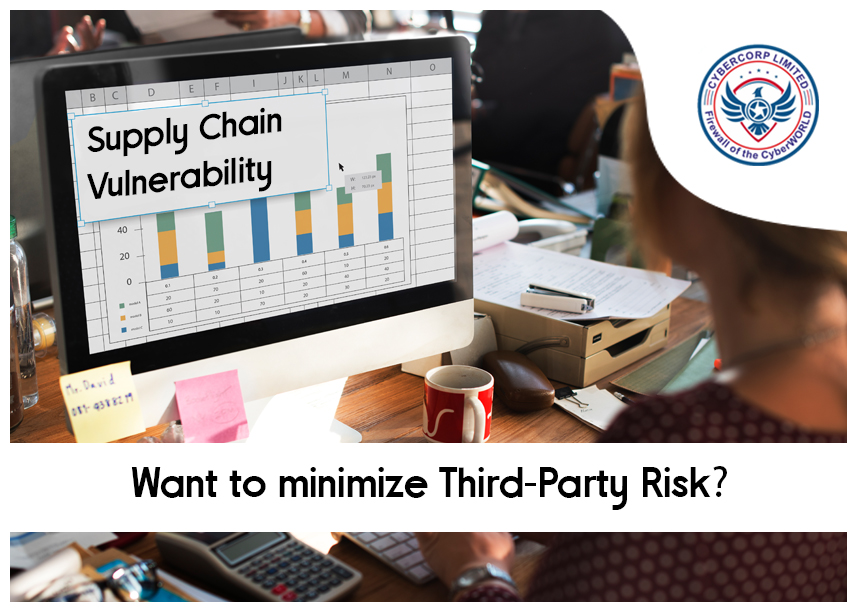
Want to minimize Supply Chain Vulnerability and Third-Party Risk? A Must-Read Guide

In today's connected global economy, companies rely heavily on supply chains to provide products and services efficiently. However, this reliance comes with inherent risks, including supply chain vulnerability and third-party risk. Disruptions such as natural disasters, geopolitical tensions, cyber attacks and regulatory changes can significantly affect supply chain operations. To effectively mitigate these risks, companies must implement proactive strategies and strong risk management practices. In this guide, we explore key steps and best practices to minimize supply chain vulnerabilities and third party risks.CyberCorp is providing utmost supply chain security to secure the entire system.
Perform a comprehensive risk assessment:
Start by assessing your supply chain ecosystem to identify potential vulnerabilities and third party risks. Assess all stages of the supply chain from procurement of raw materials to distribution and identify critical dependencies and weaknesses. Consider factors such as geographic location, geopolitical stability, supplier reliability, and regulatory compliance.
Develop risk management strategies:
Once you've identified potential risks, develop proactive mitigation strategies to effectively address them. This can mean diversifying your supplier base, creating redundant supply sources, implementing contingency plans and investing in supply chain sustainability initiatives. Work closely with key stakeholders, including suppliers, logistics partners and regulators, to implement risk mitigation measures.
Improve transparency and visibility:
Improve transparency and visibility in your supply chain to identify potential risks and effectively control activity. Leverage advanced technologies such as blockchain, Internet of Things (IoT) and data analytics to track and trace products, track supplier performance and identify anomalies in real time. Implement strong data management systems to ensure the integrity and security of supply chain data.
Strengthening supplier relationships:
Build strong relationships with your suppliers based on trust, cooperation and mutual benefit. Establish clear communication channels, set performance expectations and conduct regular supplier reviews to ensure compliance with quality standards, ethical practices and regulations. Promote supplier transparency and accountability and foster a culture of continuous improvement.
Invest in cybersecurity measures:
Recognize the growing risk of cyberattacks in supply chains and take proactive steps to protect your digital infrastructure. Implement strong cyber security measures, including encryption, multi-factor authentication, intrusion detection systems and employee training programs. Conduct regular security audits and penetration tests to identify and quickly remediate vulnerabilities.
Be nimble and adaptable:
In today's dynamic business environment, flexibility and adaptability are essential to effectively manage supply chain disruptions. Foster a culture of innovation and agility in your organization and empower employees to anticipate and respond quickly to changing market conditions, emerging risks and customer demands. Undertake digital transformation initiatives and leverage new technologies to increase operational efficiency and sustainability.
CyberCorp stands out as a leading information security provider because of its unwavering commitment to excellence, innovation and customer satisfaction. Led by a team of seasoned cybersecurity experts they do supply chain risk assessment and provide unparalleled expertise and industry-leading solutions to effectively respond to the evolving threat landscape. Using cutting-edge technology and predictive threat intelligence, CyberCorp provides comprehensive security solutions tailored to each client's unique needs and challenges.
Conclusion
Minimizing supply chain vulnerability and third-party risk requires a proactive and holistic approach that includes risk analysis, mitigation strategies, transparency, supplier relationships, cybersecurity and agility. By implementing strong risk management practices and leveraging advanced technology, companies can improve the resilience of their supply chains and effectively mitigate the effects of disruptions. Remember that proactive risk management is important not only to protect your revenue, but also to protect your reputation, customer trust and long-term sustainability.
Categories
Trending Posts
Why CyberCorp is not a mere SPAC?

We are

CoOperative Corporate
Creates a commonwealth among the partners
Cumulative Growth safeguards against losses to one entity
We believe in

Organic Growth
Promotes growth within the group companies
Ensures Maximum benefits
We do

Integration
Horizontal integration of the various products
Creating new and more effective scalable solutions
© 2022-2026 CyberCorp Limited. All Rights Reserved.



.png)






